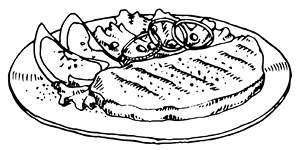
Duck Scaloppine with Dried Cherries and Grappa
Scaloppine d’Anatra alle Ciliegie e Grappa
Recipe by Mario Batali
Duck breast is not typically served this way in Italy, but I find the deep red meat with the fat still attached delicious, as well as easy to prepare. Cold duck fat gets ugly, so serve this immediately, with braised red cabbage.
MAKES 4 SERVINGS
1 whole MAGRET DUCK BREAST (about 1½ lb), split
½ cup ALL-PURPOSE FLOUR
SALT and freshly ground BLACK PEPPER
¼ cup EXTRA-VIRGIN OLIVE OIL
¼ cup DRIED CHERRIES
½ cup GRAPPA
½ cup DRY RED WINE
½ cup CHICKEN STOCK
2 tbsp UNSALTED BUTTER
1 bunch SCALLIONS, thinly sliced on the diagonal
1. Leaving the fat on, slice each duck breast across the grain into 6 equal pieces. Using a meat mallet, pound the pieces into “scaloppine” 1/8 inch thick and about 4 inches long. Season the flour with salt and pepper, and dredge the scaloppine in the seasoned flour.
2. In a 10- to 12-inch sauté pan, heat the olive oil over high heat until smoking. Add the duck pieces and cook, without turning, until deep golden brown on the first side. Add the cherries, grappa, wine, stock, and butter and bring to a boil. Cook until the liquid is reduced by half, 6 to 7 minutes, then turn the duck pieces over. Cook for 30 more seconds.
3. Transfer the duck to warmed serving plates, sprinkle with scallions, and serve immediately.
Ducks
We tend to eat the avian species who sing less well. No one to my mind has produced a CD called “Summer Duck Songs,” and the wild forms of these species—the mallards, pintails, ringbills, bluebills, wood ducks, and teal I shot for the table long ago—were equally unmelodious. In ancient times, among many primitive peoples ducks were sacred creatures—albeit readily eaten, which makes them even more sacred. Doubtless part of our current crisis of values in America is that so few of us raise any of a dozen types of delicious ducks for the table. This is not a fashionable time to compare us unfavorably with the French, but driving through the Burgundy countryside I’ve counted tens of thousands of ducks. Perhaps they should be raised on the wide-open spaces surrounding monuments in Washington, D.C.?
My friend Mario Batali is a high priest of ducks, an intercessor for the less gifted. I will cook everything he writes down, because it makes life far less brutal.